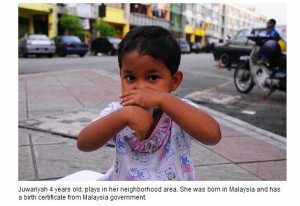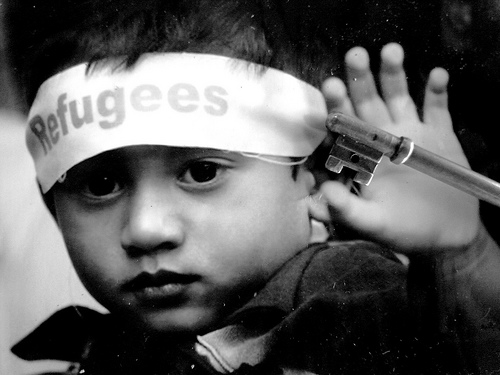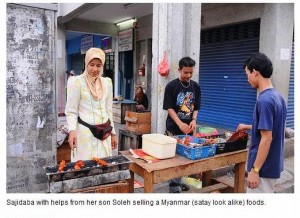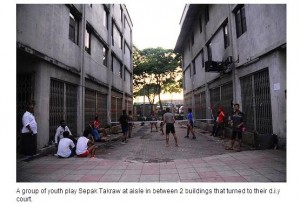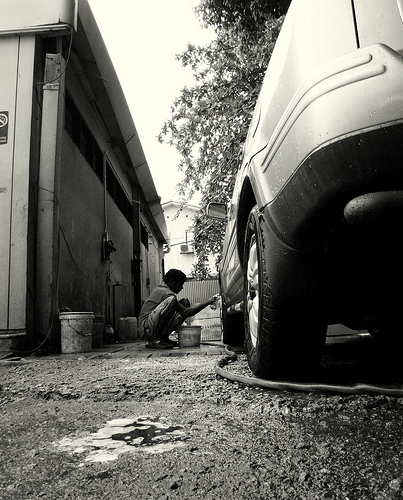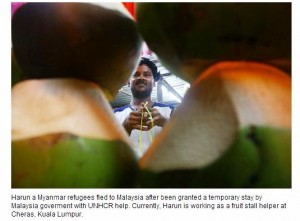In early 2009, Malaysia had the dubious privilege of being investigated by the US senate for the trafficking of humans. News reports stated [1] that the migrants involved were mostly from Myanmar, but other foreigners were also allegedly taken by the government officials to the Malaysian-Thai border, where they were extorted or sold to human trafficking syndicates.
According to AFP reports, a senate official stated:
US Senate foreign relations committee staff are reviewing reports of extortion and human trafficking from Burmese and other migrants in Malaysia, allegedly at the hands of Malaysia government officials… The allegations include assertions that Burmese and other migrants – whether or not they have UNHCR documentation– are taken from Malaysian government detention facilities and transported to the Thailand-Malaysia border.
According to the allegations, money is demanded from them at the border, or they are turned over to human traffickers in southern Thailand. However, that Malaysia might be a hotspot of human trafficking is not a new development. Veteran opposition leader, Mr Lim Kit Siang, posted on his blog [2] that Malaysia was included in the United States Government’s 2007 Trafficking In Persons (TIP) Report in the Tier 3 list of the worst human trafficking offenders in June 2007.
Mr Charles Santiago, Opposition politician, stated on his blog [4]:
The recent news report stating that the US Senate is investigating allegations of Malaysian officials extorting money from foreign migrants are linked to human trafficking comes as no surprise.
I had raised this issue in Parliament last year with regards to the Burmese refugees, together with human rights organisations like Tenaganita and the Migration Working Group. But the Home Minister Syed Hamid Albar had only glossed over the matter… responding in a typical fashion, Syed Hamid in a reply to my question in Parliament said that a special committee formed by the Immigration Department to investigate claims contained in the programme had found that immigration officials were not involved in trafficking of the Burmese or other refugees.
Either Syed Hamid is naive enough to buy the story dished out by the Immigration Department, which had set-up a special team to investigate its own officers. Or he is desperate to ensure Malaysia does not receive bad press worldwide.
Santiago went on to say:
The refugees live in fear of being caught by the immigration authorities and being deported to their countries of origin, to face political persecution, despite holding UNHCR cards.
They are constantly harassed by Rela* officers, a volunteer force, who are known to constantly be on the prowl for migrants and refugees. They even burn down make-shift homes of refugees in jungles.
If arrested, the migrants and asylum-seekers are lumped together in tiny immigration detention cells where flogging is the main form of punishment.
In short refugees live in a limbo in the country as Malaysia is yet to ratify the 1951 Refugee Convention. This means, the government does not need to officially recognise the refugees or the UNHCR documents that they carry.
It also, unfortunately, means that the government can shut a blind eye to allegations of abuse of power by immigration officers who make quick bucks extorting money from the refugees. Those who cannot pay off the extortionists are sold to brothels, fishing boats or as bonded labourers.
Meanwhile the refugees and migrants who are still in the country live in appalling conditions without proper sanitation facilities, housing, food and medicine. They and their children depend on handouts and the goodwill of others.
‘Miniaturz’, on the Star newspapers’ blog facility [6], stated:
It is to my personal hope that the US will be able to prove that the Malaysian Immigration personnels are involved in human trafficking. Although I do not approve of illegal immigrants in Malaysia, but the alleged modus operandi of the Malaysian Immigration is deliberate in nature to allow the abuse of subsequently detained illegal immigrants…
So, once again – the hypocrisy of the Malaysian Government is exposed big time. They talk about aiding the people from certain countries but right in our own country, fellow human beings are being treated like slaves for monetary purposes.
That Myanmar refugees and undocumented migrant workers face hardship is well known among Malaysians. Most urbanites, or at least those involved in civil society, are also aware of the allegations of abuse and torture in Malaysia's detention camps [7]. That Malaysia is a ‘hotspot’ for human trafficking appears to be the logical next-step in the unfortunate sequence.
In response to the investigation, the Home Ministry typically responded that Malaysia was not liable for any wrongdoing in the matter. Santiago stated on his blog [9]:
… Home Minister Syed Hamid Albar had responded in ‘typical fashion’ in Parliament on the matter by announcing the formation of a special committee to investigate the claims, which were first exposed last year by private television network NTV7.
As predicted, it was “found” that immigration officials were not involved in trafficking of the Burmese or other refugees.
This came despite testimonials to the contrary from numerous migrant rights’ non-governmental organisations as well as the victims themselves.
“Either Syed Hamid is naive enough to buy the story dished out by the Immigration Department, which had set-up a special team to investigate its own officers or he is desperate to ensure Malaysia does not receive bad press worldwide,” Santiago told Malaysiakini [10].**
Now, on April 24th, 2009, it has been reported [11] that top Republican on the United States Senate Foreign Relations Committee, handed to the Malaysian government a report “Trafficking and Extortion of Burmese Migrants in Malaysia and Southern Thailand.” The report alleges that “illegal Myanmar migrants deported from Malaysia were often turned over to human traffickers and forced to work in brothels, fishing boats and restaurants in Thailand if they had no money to purchase their freedom.”
The US Senate report, now commonly called “the Lugar Report”, was based on a year-long review by committee staff who interviewed migrants and human rights activists. According to the report:
Myanmar migrants in recent years might have become victims of extortion and trafficking once they were deported to Malaysia's northern border with Thailand. Upon arrival at the Malaysia-Thailand border, human traffickers reportedly take possession of the migrants. Migrants state that those unable to pay (the traffickers) are turned over to human peddlers in Thailand, representing a variety of business interests ranging from fishing boats to brothels.
Through the report, the US Senate Committee called on Malaysia to investigate and prosecute “the trafficking, selling and slavery of Burmese and other migrants.”
Opposition veteran, Lim, noted on his blog [13]:
The Senate investigators also received multiple reports of Burmese women being sexually abused by traffickers, including some in front of their husbands because, as one NGO employee cited in the report put it, “no one dares to intervene as they would be shot or stabbed to death in the jungle’’.
“[Burmese women] are sold at a brothel if they look good,” recounted one refugee. “If they are not beautiful, they [the traffickers] might sell them at a restaurant or house-keeping job.”
The committee launched the investigation in 2007 after hearing allegations about the trafficking of Burmese migrants “with the knowledge, if not participation” of Malaysian officials.
“The prospect that Burmese migrants, having fled the heavy hand of the Burmese junta, only to find themselves in harms’ way in Malaysia seemed beyond belief,” said the report.
Lim called on newly minted Prime Minister, Mr Najib Razak, to “respond with instant government action in keeping with his “Performance Now” motto on the Lugar Report which accused Malaysian officials of complicity in the human trafficking of Burmese refugees who have been sold into prostitution and other kinds of forced labour in recent years.”
Santiago, in response to the report, stated on his blog:
Let’s get this straight. The refugees are not coming to Malaysia seeking better economic opportunities. They simply have no choice. They run into Malaysia, leaving behind families and children, to stay alive.
Their woes do not stop once they get to Malaysia. Here they are hunted down like animals by RELA, a bully group consisting of citizens who turn ad-hoc policemen.
Their refugee cards issued by the United Nations High Commission for Refugees or UNHCR is useless as Malaysia does not recognise their refugee status. Therefore the refugees are trapped in a situation where they cannot work and are constantly under the threat of being arrested by immigration and RELA officers.
But the government is only interested in business transactions with the military junta. Malaysian state oil company, Petronas, does business amounting to millions of US dollars with Burma.
ASEAN, on the other hand, pretend they are limousine liberals while in reality, turn a blind eye to the gross violations of human rights by the military. Instead, the leaders shake hands and exchange diplomatic niceties with the Burmese army officers during ASEAN meetings.
The 10-member bloc’s non-interference policy further cushions the Burmese military from the need to be accountable to the killings and disappearances of hundreds of thousands of Rohingyas, Karens, Chins and other minority clans.
I call upon the newly minted Home Minister Datuk Seri Hishamuddin Tun Hussein to open a new investigation on the matter and consider the 10 proposal of the Lugar report including implementation the country’s Anti-trafficking Law, ASEAN’s Declaration on the Protection and Promotion of the Rights of Migrant Workers and the immediate ratification of the UN 1967 Refugee Convention – with a view to protect and promote the rights of migrants and refugees in the country and region.
Aside from the opposition's call for action, Suhakam commissioner, Mr N. Siva Subramaniam, was reported [15] to have said that Suhakam (Malaysia's Human Rights Commission) has received several complaints about human trafficking in the past two years. He was quoted as saying, “The issue has even been raised at international forums but it is difficult to compile the evidence.” Mr Siva also called on the relevant authorities “to investigate and take action against those responsible.”
The report and the calls for action has stirred the sentiments of some bloggers. Bob writes [16]:
Today in the 21st Century, in an era of globalisation, development and technology, one would think that the human race is advancing in the areas of freedom, peace and human dignity. Unfortunately this is not so. … there are more slaves TODAY than were seized from Africa in 4 centuries of trans-Atlantic slave trade. The horror is back. Buying a slave is cheaper than ever before.
TRAFFICKING IN PERSONS HAS BECOME THE FASTEST GROWING TRADE ACROSS OUR WORLD. SOME 2.4 MILLION PEOPLE ARE TRAFFICKED EACH YEAR; 1.2 MILLION OF THEM ARE CHILDREN
Every minute, every day, men, women and children are being transported, used or sold against their will. These are the victims of trafficking. They get herded across borders, across continents, sometimes in groups but they are often trafficked alone. They live in terror. Others watch their every move. They are treated like cattle. But the truth is, they’re not just a statistic. These are people – someone’s mother, someone’s child – and they’re dreaming of freedom.
Min Li states [17]:
Most people here are unaware of what exactly defines human trafficking, and that is happening right here in Malaysia. What we usually notice is the amount of foreign workers; be it Chinese, Indonesians or Bangladeshis brought here for labour… but what we don't notice is that some of them have been brought here on false promises and later forced into involuntary servitude due to debt and threats. They have no way out.
The issue of human trafficking and migrant mistreatment is an issue which many Malaysians feel strongly about. Activist and former detainee-without-trial, Nat Tan, wrote on his blog [18]:
The cycle of arrest, detention and deportation that the Burmese refugees in Malaysia experience is a vicious one. The experiences they face along the way, often riddled with violence and abuse, is a complete and utter violation of basic human rights.
Realizing the need for stronger advocacy, and a space for the refugees themselves to share their stories, Tenaganita has compiled stories from refugees who’ve been put through this cycle of arrest-detention-deportation and return to Malaysia. This book, The Revolving Door, highlights the status and situation of refugees in Malaysia, and the need for all parties to play a stronger role in supporting the refugees who live among us.
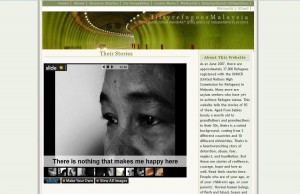
The Fifty Refugees Website
In fact, for Aris, a 37 year-old Malaysian, the issue was such a passion that the former doctor put together a website, recounting tales of fifty refugees, entitled simply “Fifty Refugees [19]“. The website states:
Theirs [the refugees] is a heartwrenching story of detention, abuse, fear, neglect, and humiliation. But these are stories of resilience, courage, hope and love as well… People who are of your age, or of your children's age, or your parents’. Normal human beings, of flesh and blood, hopes and dreams, like you and me.
Ironically, the Lugar report comes almost a year after Malaysia's Anti-Trafficking in Persons law [20] came into force. According to news reports [21], thirty-three suspected victims of human trafficking were rescued within the first four months of its enforcement.
In response to the Lugar Report, Malaysia's Prime Minister, Mr Najib, was reported [22] to have said, “We will take appropriate action… We do not want Malaysia to be used as a point for human trafficking … but we need to know more facts.”
* the People’s Volunteer Corps (Rela)
** an alternative news portal
Photos courtesy of Adli Ghazali [23] and M.A.M09 [5]
